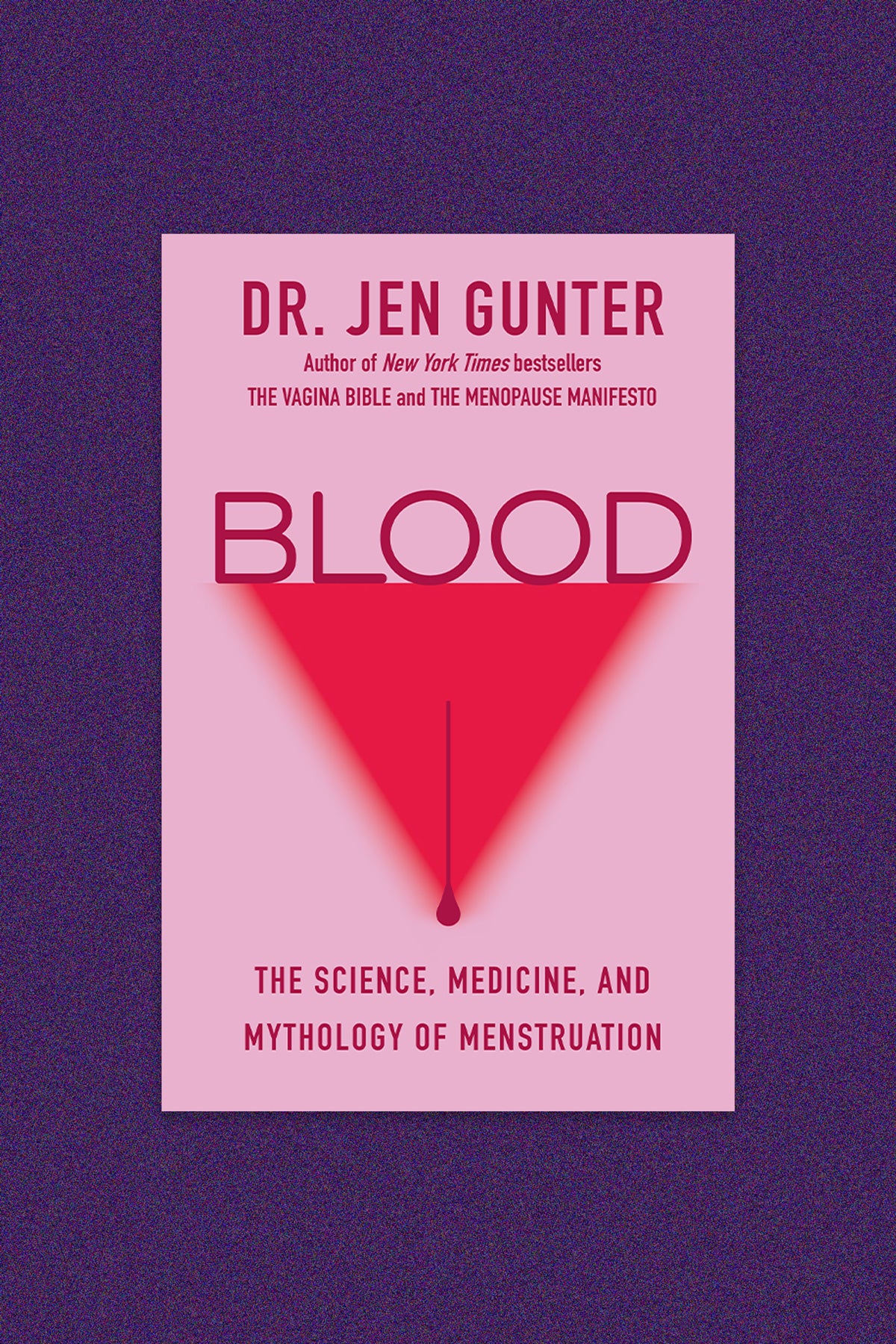
Book
Periods and patriarchy
Jen Gunter, an OB/GYN and pain medicine physician, got her start as a writer more than a decade ago, after her sons were born prematurely. As she sought out information online to support their health, she discovered just how easy it is to fall down a rabbit hole of mis- and disinformation. Since then, she’s launched a blog, The Vajenda, that mixes evidence-based reproductive health information with righteous indignation. She’s also built robust followings on social media, where she’s known for her sharp-tongued takedowns of dubious health influencers and supplement peddlers (including a famous manifesto against Gwyneth Paltrow-endorsed “jade eggs”).
Her new book, Blood, focuses on menstruation. About a quarter of the world’s population menstruates each month, yet the process remains cloaked in ignorance and shame. Gunter offers a comprehensive and accessible overview of the menstrual cycle, the common concerns that face menstruating people, and the treatments available for reproductive health complications. She also takes aim at a patriarchal medical system that has long treated women as off-brand men and dismissed their unique health issues. It’s a must-read for anyone who menstruates and has ever wondered, “Am I normal?”
Gunter recently spoke with Harvard Public Health senior editor Amy Roeder about her latest book and how she found her voice as the internet’s OB/GYN.
This interview was edited and condensed.
Harvard Public Health: You’ve already published two books on women’s health—The Vagina Bible and The Menopause Manifesto. What led you to write your latest book, Blood, about menstruation?

Jen Gunter: I initially wrote The Vagina Bible because of the onslaught of bad information about women’s health that I was seeing online. When I was on tour for that book, everybody wanted to ask questions about menopause. And then during the pandemic, I started seeing a real rise in disinformation about periods, especially on Instagram and TikTok. That made me realize the need for a science-based, accessible primer on the menstrual cycle—how it works and how to get appropriate care if you need it.
HPH: In Blood, you write very candidly about your own struggles with heavy periods when you were young. Back then, did you have anyone you could talk to about what was going on?
Gunter: No, not at all. I started my period in the late ’70s, early ’80s. It wasn’t something my mother talked about, and it was mentioned maybe once in health class. My main source of information was a girlfriend who got her period a year before me—so, not the best source. At the time, I just assumed what I was going through was normal. Eventually, I started to realize that I hadn’t been given enough information to even begin to self-advocate. I’m sure in the back of my mind that was one of the reasons why I went into gynecology.
Sign up for Harvard Public Health
Delivered to your inbox weekly.
HPH: What have you learned about health communication since you started writing your blog?
Gunter: That being authentic is what really matters. I noticed early on that when I made my posts conversational, they resonated much more with people. We know now that when we talk to people about health information, we need to ditch the jargon and talk in a way that is familiar. When I’m trying to explain something in a post or a book, I often think about how I feel when I go to the car dealership or when I have to get my computer fixed, because I am completely illiterate about cars and computers. I panic in these situations, trying to talk to an expert about something that is so basic to them.
But when I first started blogging, I was criticized by a lot of people in medicine for the way I wrote. I included a swear word in a post! I’m like, they should be more upset about Dr. Oz on television talking about things like green coffee bean extract for weight loss. What’s actually harming patients?
HPH: You write about how a patriarchal medical system created gaps in care—and opportunities for charlatans to fill those gaps. Can you explain more about those gaps and what people can do to advocate for themselves?
Gunter: Women were long viewed as lesser and more troublesome versions of men, and their reproductive tracts were studied primarily to improve pregnancy outcomes. This has resulted in inadequate research and education about the female body and in the dismissal of women’s health concerns.
I wrote a post years ago about why you can get an IUD if you have never been pregnant. Unfortunately, there are still some doctors in the U.S. who think you can’t. A woman contacted me to say that she had gone to her doctor for an IUD and brought a printout of my post. When he said no, she said she slammed it down on the table and said, “Dr. Jen Gunter says I can.” I get a lot of stories like that. People who were suffering from hot flashes and their doctor wouldn’t prescribe hormones, so they took my advice and found a new practitioner. Or my post made them feel better about something scary they saw on TikTok. It makes me feel really good to be filling gaps for people. There are a lot of gaps, and there are lots of people taking advantage of those gaps to sell products. The answer to serious problems like the underfunding of women’s health, rushed appointments, or providers with poor communication skills isn’t a supplement.
The main thing I would say to people is that knowledge is power. The more that you know about how your body works, the more you’re going to be able to navigate the system, live with that body, and find out what’s going to help you.
HPH: Do you hear from cisgender men who find your work helpful?
Gunter: I actually have a lot of men who follow me. Some are probably there because they appreciate the salty language of the comebacks, but a lot of them want to support a partner with an issue, or to be able to provide helpful information to their daughter. That’s amazing.
I always say, especially in the new book Blood, that every single person on this planet is here because of the menstrual cycle. That’s why everybody should learn about it.
HPH: What’s your top takeaway for people with vaginas?
Gunter: The hymen is a scam. It’s not actually a virginity indicator. But it’s named after the Greek god of marriage. That’s pretty bad, right? These days, most people probably don’t know that origin, but doctors who trained in the 1950s and ’60s probably did. We know that what we call things has an impact on how we think. So how could a term like that not have impacted many generations of physicians?
Book cover: Citadel/Kensington Books
Gunter: Talia Herman


